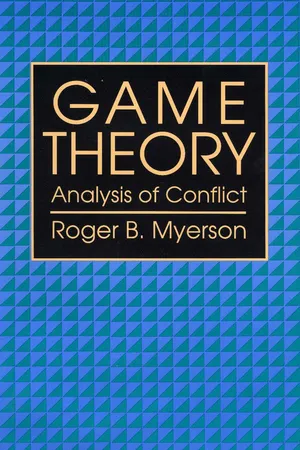
- English
- ePUB (mobile friendly)
- Available on iOS & Android
About this book
Eminently suited to classroom use as well as individual study, Roger Myerson's introductory text provides a clear and thorough examination of the models, solution concepts, results, and methodological principles of noncooperative and cooperative game theory. Myerson introduces, clarifies, and synthesizes the extraordinary advances made in the subject over the past fifteen years, presents an overview of decision theory, and comprehensively reviews the development of the fundamental models: games in extensive form and strategic form, and Bayesian games with incomplete information.
Game Theory will be useful for students at the graduate level in economics, political science, operations research, and applied mathematics. Everyone who uses game theory in research will find this book essential.
Frequently asked questions
- Essential is ideal for learners and professionals who enjoy exploring a wide range of subjects. Access the Essential Library with 800,000+ trusted titles and best-sellers across business, personal growth, and the humanities. Includes unlimited reading time and Standard Read Aloud voice.
- Complete: Perfect for advanced learners and researchers needing full, unrestricted access. Unlock 1.4M+ books across hundreds of subjects, including academic and specialized titles. The Complete Plan also includes advanced features like Premium Read Aloud and Research Assistant.
Please note we cannot support devices running on iOS 13 and Android 7 or earlier. Learn more about using the app.
Information
1
Decision-Theoretic Foundations
1.1 Game Theory, Rationality, and Intelligence
Table of contents
- Cover
- Title Page
- Copyright Page
- Dedication
- Contents
- Preface
- Chapter 1. Decision-Theoretic Foundations
- Chapter 2. Basic Models
- Chapter 3. Equilibria of Strategic-Form Games
- Chapter 4. Sequential Equilibria of Extensive-Form Games
- Chapter 5. Refinements of Equilibrium in Strategic Form
- Chapter 6. Games with Communication
- Chapter 7. Repeated Games
- Chapter 8. Bargaining and Cooperation in Two-Person Games
- Chapter 9. Coalitions in Cooperative Games
- Chapter 10. Cooperation under Uncertainty
- Bibliography
- Index